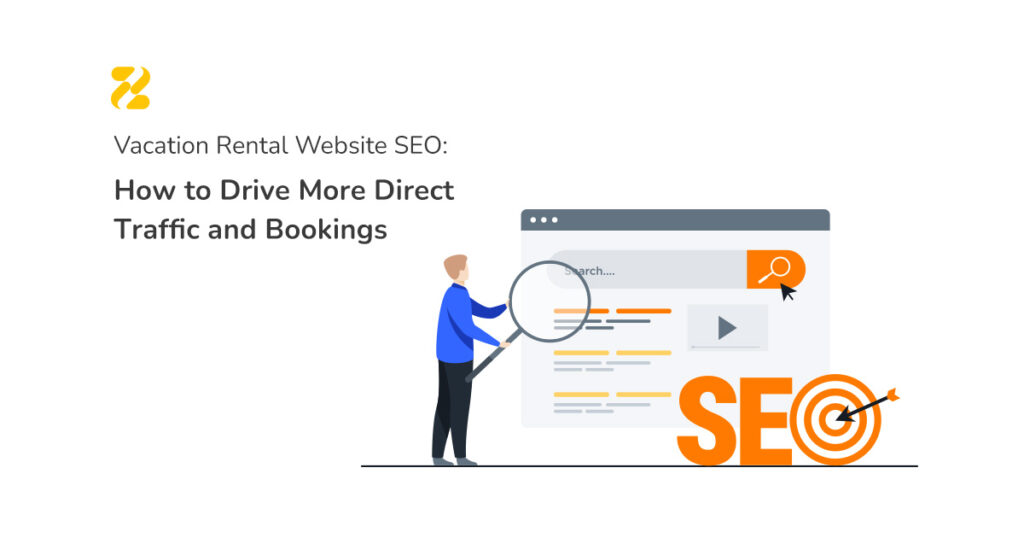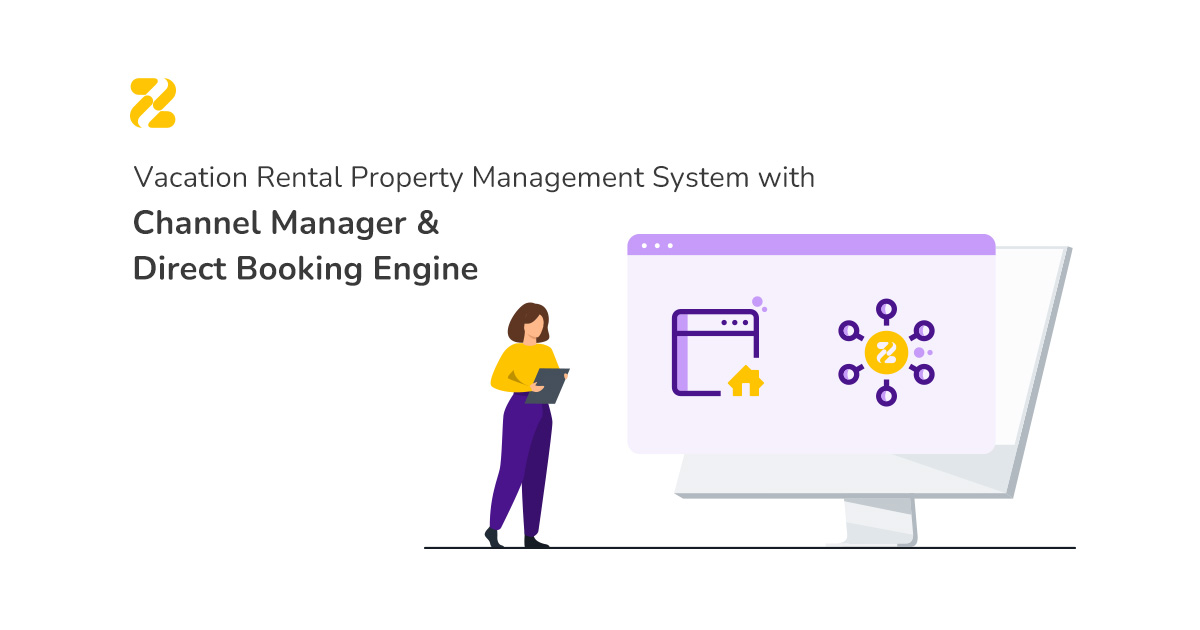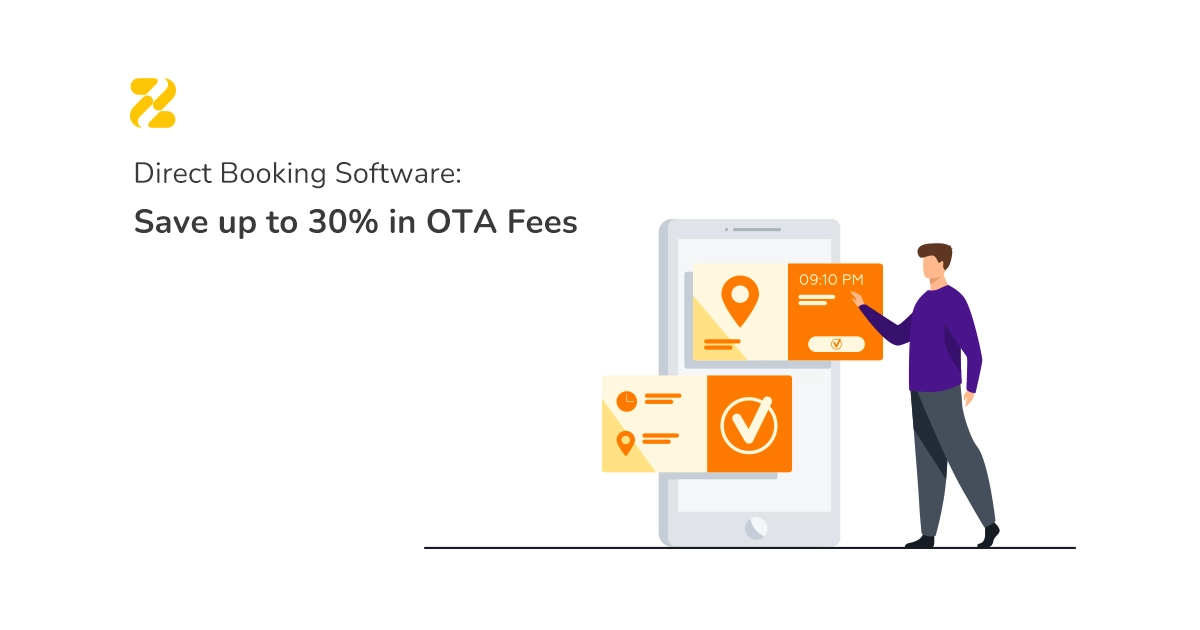In today’s competitive short-term rental market, simply listing your property on major booking platforms isn’t enough to stand out. For hosts managing large portfolios, relying solely on OTAs can limit growth.
Holiday rental websites allow you to scale bookings efficiently, reduce commissions across the board, and centralise brand visibility. However, for a direct booking website to succeed, it needs to be easily found online, and that’s where vacation rental SEO becomes essential.
This blog post will guide you through proven SEO strategies for vacation rentals to help you drive more direct bookings.
Table of Contents
Local SEO for Short-Term Rentals
One of the most powerful ways to improve your vacation rental SEO is through local keyword research. Data shows that 46% of Google searches are local, with 78% leading to offline conversions, a key value for direct booking websites.
Since most travellers search for accommodation based on location, targeting geo-specific keywords is essential.
Segment Your Strategy by Region
If you manage listings across different regions, your keyword strategy should be segmented. For example, instead of just optimising for “vacation rental,” aim for more specific phrases like “Cornwall beach house rental” or “Lake Tahoe ski cabin.” These keywords match what potential guests are actually typing into search engines when they’re ready to book, improving your vacation rental SEO.
Focus on High-Intent, Long-Tail Keywords
To find the right keywords, focus on high-intent search terms – phrases that indicate the user is actively looking to stay somewhere, not just browsing. Think beyond generic terms and consider what your ideal guest would search for. Are they looking for a “pet-friendly cottage in the Cotswolds,” a “central flat in London,” or a “family-friendly seaside home in Brighton”?
These long-tail keywords may have lower search volume, but they’re highly targeted and more likely to convert into bookings.
Use Keyword Tools to Guide Your Research
You can discover these terms using free or low-cost tools like Google Keyword Planner, Ubersuggest, and Google Trends. These tools help you identify keyword popularity, competition levels, and variations you might not have considered.
The goal is to build your content and pages around the exact words your target audience is using. So, your direct booking website shows up when they’re searching for a place like yours.
Ready to optimise your direct bookings? Explore Zeevou’s solutions now!

On-Page SEO for Vacation Rentals
Once you’ve completed your local keyword research, the next step in your vacation rental SEO strategy is on-page optimisation. You should ensure each page on your direct booking website is structured to help search engines understand its content.
Use Keyword-Rich Titles and URLs
Start with the basics: titles, meta descriptions, headers, and URLs. These elements should all include relevant location-based keywords. For example, instead of a generic title like “Beautiful Home for Rent,” use something more specific, like “Oceanfront Vacation Rental in Edinburgh – Sleeps 6”.
The same applies to your meta description. It should be clear, enticing, and contain keywords like “pet-friendly,” “city centre,” or the name of your destination.
Headers (H1, H2, etc.) help structure your content and make it easier for both users and search engines to scan. So, ensure they include relevant terms.
Write Unique Descriptions
Next, focus on your property descriptions. Avoid copying and pasting the same description across multiple listings. Instead, write unique, keyword-rich content that highlights what makes your rental special. A compelling description not only helps with vacation rental SEO but also convinces potential guests to book.
Optimise Images
Don’t overlook your images. Search engines cannot ‘see’ images as humans do, so it’s important to optimise image ALT text and filenames. Use descriptive keywords, such as (malibu-beachfront-patio.jpg)and ALT text like “sunset view from Malibu oceanfront rental.”
This enhances your direct booking website and helps with accessibility for users with screen readers.
Technical SEO for Vacation Rentals
Technical SEO is the behind-the-scenes work that ensures your vacation rental website is fast, secure, and user-friendly. Though less visible than content or design, it significantly impacts your site’s ranking and ensures a smooth experience for potential guests.
Ensure Mobile-Friendliness and Fast Loading
Most travellers search for accommodation on their phones, so your site needs to look and function flawlessly on mobile devices. Since direct booking websites rely on high-quality images, optimising them for fast loading is essential for your vacation rental SEO.
Compress large images, use next-generation formats like WebP, and enable lazy loading to improve speed and reduce bounce rates.
Use Schema Markup for Rich Results
Structured data, commonly referred to as schema markup, is a powerful tool for optimising vacation rental websites for search engines. By implementing schema markup, you provide search engines like Google and Bing with explicit, machine-readable information about your website’s content.
This clarity helps search engines better understand your vacation rental listings’ context and details. It can lead to enhanced visibility through rich results in search engine results pages (SERPs).
Rich results are visually engaging elements, such as star ratings, pricing details, availability calendars, or interactive maps that make your listing stand out, often resulting in higher click-through rates (CTR) and improved user engagement.
Schema markup is based on a standardised vocabulary (Schema.org), which is supported by major search engines. For vacation rental websites, schema markup can be applied to various elements of a listing. This includes the property’s name, description, location, pricing, availability, guest reviews, amenities, and booking options.
When implemented correctly, schema markup improves both vacation rental SEO and the user experience by displaying key information directly in search results. This can give your holiday rental business a competitive edge, especially in a crowded market.

Improve Crawlability and Indexing
Finally, ensure your direct booking website is crawlable and indexable. This means search engines should be able to easily find and read all of your important pages.
Submit an XML sitemap to Google Search Console and Bing Webmaster Tools. Also, ensure your robots.txt file is optimised for an effective vacation rental SEO strategy.
In short, strong technical SEO for vacation rentals makes your website more discoverable, trustworthy, and user-friendly.
Ready to optimise your direct bookings? Explore Zeevou’s solutions now!
Content Strategy for Vacation Rental Sites
A strong content strategy boosts vacation rental SEO and attracts travellers in the planning stage.
Write About Local Attractions
Start by blogging about local attractions, travel tips, seasonal events, and itineraries. For example, posts like “Top 10 Things to Do in the Lake District This Autumn” or “3-Day Itinerary for a Weekend in Kent” target long-tail keywords and position your direct booking website as a helpful local resource.
Answer Common Guest Questions
You should also focus on creating content that answers common guest questions. These are the queries people often type into Google when planning a trip, like “Best time to visit Joshua Tree,” “Is Charleston walkable?” or “What to pack for a winter trip to Lake Tahoe.”
Use these questions as blog post titles or FAQs on your site to capture high-intent traffic and keep visitors engaged.
Internal Linking Best Practices
Internal linking is a simple yet powerful vacation rental SEO technique that helps search engines understand your website’s structure.
For holiday rental websites, strategic internal linking can boost rankings, increase time spent on your site, and ultimately drive more direct bookings.
Make Connections between Content and Pages
Start by linking between property pages, blog posts, and landing pages. For example, if you have a blog post about “Top Hiking Trails Near Sedona,” include links to nearby rental listings.
Likewise, each property page can link to related blog content, such as local travel tips or dining guides. This way, you can keep users engaged and encourage deeper browsing.
Build a Clear and Logical Site Structure
A logical site structure is key to both user experience and SEO. Organise your pages into clear categories, such as rentals by location, type (e.g., cabins, flats), or features (e.g., pet-friendly, beachfront). Then, ensure important pages are easily accessible from your homepage or navigation menu.
A well-structured direct booking website helps search engines crawl and index your pages more efficiently.
Use Keyword-Rich Anchor Text
Use descriptive anchor text when adding links. Instead of vague phrases like “click here,” use keyword-rich text like “pet-friendly vacation homes in Scottsdale” or “family-friendly activities in Gatlinburg.”
This not only improves usability but also signals relevance to search engines, reinforcing your site’s authority on those topics.

Backlink Building and Local Citations
Building a strong backlink profile is a critical part of vacation rental SEO. Backlinks act as votes of confidence in the eyes of search engines, signalling that your site is trustworthy and relevant.
For vacation rental businesses, earning local and travel-related backlinks can significantly improve your rankings and visibility in local search results.
Earn Backlinks from Local and Travel Sites
One effective way to build backlinks is by partnering with local tourism boards, bloggers, and travel websites. Reach out to regional travel influencers or local bloggers and offer them a stay in exchange for a review or feature.
Being included in tourism board listings can not only provide quality backlinks but also drive highly targeted referral traffic from people interested in your location.
Get Featured in “Top Stays” and Travel Roundups
Another valuable tactic is getting featured in “top stays in [city]” or “best Airbnbs in [location]” roundups. These lists often rank well in search results and are commonly used by travellers during their research phase.
Reach out to the content creators and pitch your rental for inclusion, especially if your property has unique features or glowing reviews.
Vacation Rental SEO for Multiple Locations
If you manage holiday rentals in multiple cities or regions, your vacation rental SEO strategy needs to reflect that. Targeting multiple locations can dramatically increase your reach and direct bookings if done correctly.
Create Unique Pages for Each Destination
Start by creating dedicated landing pages for each location. For example, if you have rentals in Cornwall, the Lake District, and Edinburgh, each area should have its own page like “/cornwall-holiday-cottages,” “/lake-district-lodges,” or “/edinburgh-city-apartments.”
These pages should include local keywords, detailed property information, nearby attractions, and area-specific travel tips. This not only improves your rankings for geo-targeted searches but also enhances user experience.
Avoid Duplicate Content Across Locations
One of the biggest pitfalls to avoid is duplicate content. Don’t copy and paste the same descriptions across all location pages – search engines may penalise your site for this.
Instead, write unique content for each location, highlighting what makes the area and its rentals special. Even if the amenities are similar, the local SEO and context should differ.
Organise Your Site by Region
For hosts managing listings in multiple areas, it’s essential to organise your site structure logically. Consider adding a main “Locations” tab on your navigation menu that links to each city-specific page.
You can also connect them internally through blog posts and featured recommendations.
Tracking and Improving Vacation Rental SEO Performance
Tracking and continuously improving your vacation rental SEO performance is crucial for maintaining long-term success in driving direct traffic and bookings. Without regular monitoring, you may miss opportunities to optimise your direct booking website further. By setting up key tools and analysing the right data, you can make informed decisions that enhance your site’s visibility and conversion rates.

Set Up Essential Tools: Google Analytics and Search Console
Setting up Google Analytics and Google Search Console is the first step in tracking your direct booking website’s performance. Google Analytics provides detailed insights into your visitors’ behaviour. This tool shows metrics like traffic sources, bounce rates, time spent on pages, and conversion rates.
Google Search Console, on the other hand, shows how well your site is performing in search results, highlighting issues like indexing problems, keyword rankings, and backlinks.
Track Keyword Performance and Traffic Trends
Monitoring keyword rankings and traffic sources is essential for understanding top-performing keywords and areas for improvement. Use tools like Google Analytics, Ahrefs, or SEMrush to track how your pages are ranking for targeted search terms.
Pay attention to any shifts in rankings to spot optimisation opportunities or potential penalties requiring attention.
Leverage Data to Continuously Optimise Content and Boost Conversions
Making data-driven updates is key to improving both your visibility and conversions. Once you know which keywords drive traffic and which pages have high bounce rates, you can update your content to target additional keywords or refine your messaging to increase engagement.
If you notice that certain pages are underperforming, consider tweaking the design, improving internal linking, or optimising titles and descriptions. Regularly testing and updating your content ensures that your vacation rental SEO strategy evolves with changing trends and search algorithms.
Conclusion
In today’s competitive market, mastering vacation rental SEO is essential to increase visibility, attract more guests, and boost bookings. By implementing strategies like local SEO, technical SEO, and high-quality content, you can significantly improve your website’s performance.
Don’t let your vacation rental get lost in the crowd and stay ahead with Zeevou’s direct booking solutions.
Image by pch.vector on Freepik.




